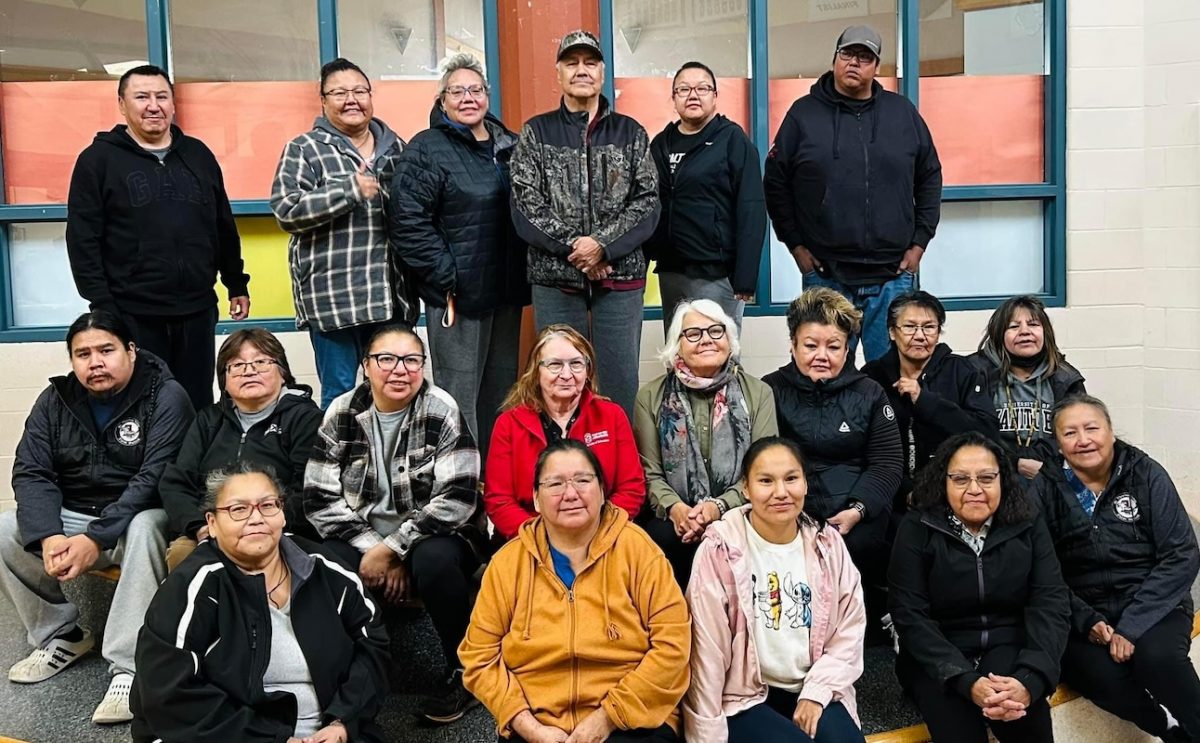
Indigenous teachers from St. Theresa Point who are part of the the Ansininew Cohort in Inclusion and Reconciliation in the Faculty of Education.
Celebrating the Ansininew Cohort in Inclusion and Reconciliation
19 Indigenous teachers are graduating with their Post Baccalaureate Diploma in Education this October
A new cohort is about to graduate from a Faculty of Education program designed in partnership with St. Theresa Point (STP) First Nation.
The 19 Indigenous teachers from St. Theresa Point comprise the Ansininew Cohort in Inclusion and Reconciliation. They have successfully completed the requirements to receive a Post Baccalaureate Diploma in Education (PBDE) at convocation this October.
The PBDE is an innovative program that responds to professional development needs of educators by fostering collaboration between educators, community stakeholders and academic experts. The cohort-based approach of the program ensures that professional development initiatives are responsive and rooted in local contexts.
The Faculty of Education will hold a special reception for the graduates on October 23.
“It’s definitely something to celebrate!” says Senior Scholar Charlotte Enns, who was recently named Professor Emerita after she retired from the Faculty of Education in May.
Enns worked to implement the program along with other faculty instructors, support staff and administrative staff.
16 of these graduates, along with five other teachers/school administrators from the community have also been accepted to begin an M.Ed. program in Inclusive Education in Fall 2024.
“The program has exceeded our expectations,” says Enns. “The PBDE program finished their last course in the Summer 2024 term. That means they completed 30 credit hours of coursework in two years while working full-time as teachers. For the master’s program, we were hoping to recruit 10-15 people, so the fact that 21 people were admitted is amazing!”
What stands out for Enns about the program participants is their commitment, and their motivation to improve education for the children and young people they teach.
“Several of these teachers attended residential schools, or their parents or other family members did, so they are well aware of the changes needed in the education system,” she adds.
‘Establishing relationships and building trust must come first’
Asked what the lessons have been so far, Enns says that those working to implement the program have started to learn just how much our university systems create barriers for these learners.
“We take for granted that written information on the website, or sent by email, makes things accessible, but we have learned that establishing relationships and building trust must come first,” she notes.
To help with building relationships and trust, the program created a liaison process by identifying key contacts at the university and in the community.
Designing and implementing the program
The program has been designed to respond specifically to community-identified needs, rather than starting from pre-determined requirements. The program structure, courses, and delivery methods are developed through that process.
“We see consulting and collaborating on all decisions, from courses, delivery methods, scheduling and hiring instructors, as essential,” she says. “The relationships built have been critical to the program’s success.”
Educational administrators of St. Theresa Point met to discuss the needs and priorities for their teachers and determined two main areas for professional development:
- Culturally relevant assessment and instruction, particularly focused on inclusion and academics (literacy);
- Reconciliation in working with parents/families; history and impact of residential schools; trauma-informed pedagogy.
These areas are also closely aligned with the Faculty of Education’s focus on equity, diversity and inclusion and Indigenous Education, particularly efforts to respond to the TRC Calls to Action.
Working together to make change
Enns emphasizes that this project — like many of the activities focused on Reconciliation in the Faculty of Education — “was motivated and guided by the words of Honourable Murray Sinclair, ‘Education got us into this mess, and education will get us out of it.’”
One of the best ways to promote equal educational opportunities for First Nations students and is by “ensuring that they have well-qualified teachers who can meet the needs of all students in their schools and motivate students to stay in school,” she says.
“We want to work together and make change happen.”






